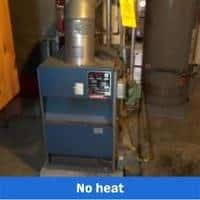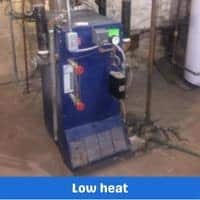Utica Boilers Troubleshooting. The burner of the boiler may not be set correctly. Resetting if the burner doesn’t work can make your burner work.
The electric boiler may not have power. The vent damper of the boiler may not be operating. Fix the relay operation to get it right.
I had Utica boilers in my house as the Utica boilers have already kept me warm, and never had I felt cold because of them. But suddenly, my boiler stepped, and I felt the chill when I woke up the following day.
I felt like a frozen fish and found that my boiler was the culprit. The boiler has stopped working late at night.
I didn’t fix it as I was sleepy, but I regretted not fixing the boiler in the morning. After I had been lazy enough, I troubleshot my boiler and fixed the boiler by myself.
Utica Boilers Troubleshooting
Having a boiler, be it an electrical boiler or one running on gas, you have ease of temperature, but if the machines are taken away, the chill doesn’t let you relax.
If you have had a boiler that pranked you by getting faulty on a chilly night, you should troubleshoot it.
If the troubleshooting method is unknown, then you should see this article. First, determine whether the boiler you have is gas or electrical.
You will know if you need to check the power source or the gas source according to your boiler. Fix them all. Read more below.
No heat
The most common or the worst boiler issue is the boiler not heating. Heating is the boiler’s job, so you will not feel delighted when there is no heat from your heating device.
If the heating device descended gives heat, then there can be several boiler issues in that. First is the fuel. The fuel in the boiler doesn’t necessarily mean oil.
It means both electricity and gas. The electricity is in the electric heating devices while gas is in the device that works on gas. There are other possible reasons that the boiler doesn’t give heat.
The radiators of the boiler may not be heating at all. The radiators don’t heat because of power or fault. The fuel in the chimney is not reaching the device.
The event damper on the device may not work properly. The vent blown can also be blocked. The vent damper may not be operating at all. The amount of gas you have connected to the boiler is not correct.
The blocking and logging in the parts of the boiler is the reason you don’t get any heat at all. Incorrect use of the boiler can also make it not work.
Fix
If the boiler doesn’t have enough electrical support, you should try to get the boiler enough power.
If the gas boiler is the one you are using, then get the boiler the gas it needs. The pilot line is probably not on because of the gas, so get the gas to the boiler.
If the radiator of your boilers was not heating, then they have air trapped, so get the air out and let the air flow.
The blocks I mentioned or the clogs in the chimney should be opened as well. You should see the relay operations at least once.
Low heat
If you have heat coming from the boilers, then you may have other problems. What if the heat from the boiler is too low?
The boiler should have heat that can warm the house, but if the heat from the boiler is too low, then it’s almost negligible.
The reasons are almost similar to having no heat at all. In not receiving heat, you had no power, and thus, the boiler didn’t work, but in low heat, the power is also low but not completely off. The gas to the boiler may also be low.
If the heater is not getting through, then there can be partial clogs or blockages that are closing the flow partially.
The partial clogs will only allow partial ait to pass and the partial flow won’t ignite the radiators completely, so you should check the partial clogs and blockages as well.
The boiler setting can also be wrong as well. The connections can be a little loose, so the flow is also low.
The radiators may not be heating correctly as they should. The vent damper is not in your settings. You have set the boiler incorrectly. Read the fix.
Fix
If the boiler has low heat, then set the temperature of the boiler a little higher and see if the temperature rises.
The partial clogs should not be left alone either, so find suitable chemicals and instruments to get the partial clogs out of the events and other parts.
If you think that the pilot is not lit properly, then make sure you light the pilot properly or fix the reason it wasn’t like that.
Fix the cable joints and the terminals that are loose by securing them. Fix the heat exchange and other vent blockages as well.
Too high heat
After getting low heat and no threat at all, we go to the extreme problem in which the boiler gives too much heat. Too much heat is not good either, as even in winter, you may not like having too much heat.
The circulation of the heating system is the main reason the temperature becomes too high for everyone to handle. The reason for improper circulation may be the central heating system or the taps.
The heating system may not circulate successfully as well as the taps. Thus, the improper circulation is causing too much temperature.
The setting of the thermostat that is connected to the cylinder you set high may have been set too high, and that is causing you heating trouble now.
The pump of the boiler may have been defective, and the heat transfer through it is too much. You can have limescale in the system that is causing the temperature to be high for you.
The thermistor has faults that not letting it work at the normal temperature, and instead, the thermistor automatically sets the too high temperature for you.
Power surges can make the machine heat, and that heat can cause further heating.
Fix
If there was limescale in the system, then you need chemicals and tools to remove the limescale and get the system clean. A chemical flush can clear the limescale instantly.
The pump may have defects, so you may need to repair the problems in the pump manually.
If you have set the temperature of the pump wrong, you may need to set the temperature properly. Set the te[arture to normal rather than getting it too low.
The thermistor is usually faulty, and fixing a thermistor is no choice at all. Replace the thermistor or get it replaced.
Unfamiliar sounds
If the heating is set, then you may have other issues that are keeping you disturbed. You may have unfamiliar sounds or noises coming from your boiler as well. The unfamiliar noises may include a popping sound from the boiler.
Whistle sounds are much more common from the boiler than from the popping sound. Both the whistle and popping sounds don’t mean anything good.
The whistle and the popping are like problem indications in the boiler, and they are caused because of several problems in the boiler. The amount of gas passing through and the pressure are its factors.
If the gas that you are giving to the boiler is incorrect, you may face a problem. The debris can build up inside the
boiler or at the bottom of the burner, and that gunk built at the bottom of the boiler will make a lot of noise as well. The gas pressure also makes noises.
If the gas pressure is too high, then you will hear a whistling sound. You may hear a whistling sound if the gas is leaking or the airflow is unlocked. The noise problems in the boiler should be fixed fast.
Fix
If you have noises coming from the burner, then first check the type of noise. The popping noise can be the same as the whistling noise, so check for leaks at first.
If there are more leaks, check for pressure or lower the pressure to make the pressure suitable for the sound to disappear.
Make the input of the gas to the burner correct. The pressure of the gas has been stabilized, so the amount of gas should be the same.
You can flush the boiler to remove the debris and get the cleaning done. Clear clogs so the whistling and popping can end.
Conclusion
If you have boilers that are giving problems like they are not heating or heating too much, then getting the temperature in control and sounds coming from the boilers should not be neglected either. Fix the boiler or get the boiler fixed by a professional. Thanks for reading!
Related Guides



